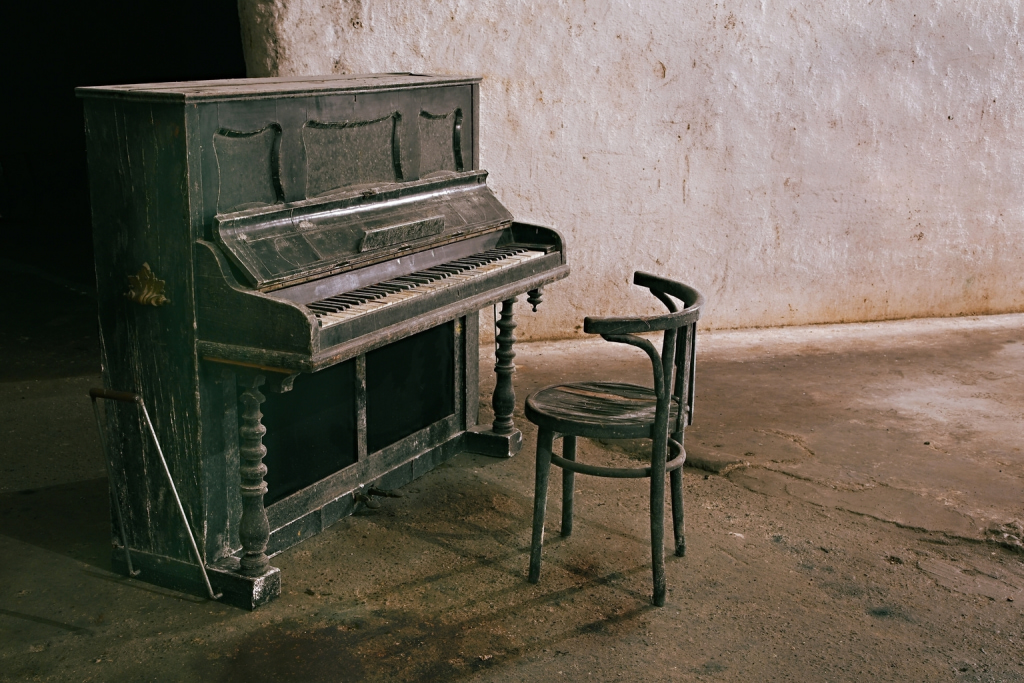Tokyo Weekender’s series TW Creatives features various works by Japan-based writers, photographers, videographers, illustrators and other creatives in a bid to provide one additional platform for them to exhibit their talent. The works submitted here belong entirely to the creators. TW only takes pride in being one of their most passionate supporters. This time, we introduce a short story by Eric Margolis, who recently published his novel, The Golden State,
A Story About My Grandfather and His Grandfather
My grandfather trashed his piano on Purim. Intoxicated by the holiday commandment to inebriate, he drank himself into a stupor and briefly dozed off before emerging red-faced and righteously enraged.
“HOW COULD MY ANCESTORS DO THIS TO ME!” he roared, wielding a golf club, and with a well-placed stroke, whacked the back-right leg straight off the piano. The leg whipped across the room and stabbed into a large black and white portrait of my grandfather’s grandfather, Shmuel, smack-dab in the center of his oversized beard. The piano lurched backwards in a tumultuous crash and clamor of banging strings.
“Pop-pop, you’re out of control!” I hollered, a golf club of my own in hand, just in case.
“WHAT DID YOU SAY, RUBY?”
“I SAID, POP-POP, YOU’RE OUT OF CONTROL!”
“I’m in perfect control!” he growled, adjusting his kippah, straightening his back, and aiming a swing at the back-left leg. I braced myself for the smash and crumple as the piano fell, but this time I heard a distinct melody, a strange, humming trill as the side of the piano with the longer, deep-pitched strings rammed into the wooden floors.
Much of me was terrified, but a small part of me was relieved. Our house was far too small for a piano, anyways, and even when Pop-pop played his gentlest, he was still banging out old jazz crooners for the most part, and they were way too loud for me to concentrate on writing papers.
“Your turn,” he said, tossing me the golf club, which I snatched with my left hand. So now I had two of them.
“Eiiiit-t-t-t,” winced Pop-pop as he lowered himself down on to the unharmed piano bench. His face was scorching red. Splinters littered the room.
“Why are we doing this?” I asked him.
“Oh, you know how I hated my grandfather, Ruby.”
“I didn’t know you hated him enough to destroy his piano.”
“His piano?” Pop-pop scoffed. “Sure, it may have technically been Zayde’s piano, but I’ve never seen him play it. Only mom. Not that she was much good at piano. Remind me Ruby, why did we decide to celebrate this godforsaken holiday?”
“Not godforsaken, Pop-pop, the Jews were saved on this day.”
“Not this Jew!”
“You haven’t needed saving.”
“Says who?”
“Also you haven’t answered my question about why you’re destroying that piano. It must be worth —”
“Sheesh, Ruby, what’s in a dollar? What’s in a shekel, eh?” Pop-pop rubbed his fingers together and then pressed them to his forehead. “This instrument, I’ll never master it. There’s no point! I regret the damage to the house, though, I love this damn house.”
“What if I wanted to learn?”
“You did?” Pop-pop heaved his heavy frame up to his feet and instantly teetered. “Well why didn’t you say so, Ruby, I’ll get it fixed up in no time!” He bent down to inspect the piano. “The legs are broken and some of the strings have snapped, but this is nothing a proper piano wiz can’t fix!”
I walked over, transferring the second golf club to my left hand, and peered into the piano. He was right. Most of the wires were still whole and the frame’s body was intact, if not a bit disjointed.
“In fact, it’s starting to piss me off, how good shape this bastard’s in,” Pop-pop growled.
“This is one damn good piano.”
“Sit back down, Pop-pop,” I said, and he did.
“Listen, Ruby, I’m sorry you had to see me like this. But my Zayde was a real bad character. An asshole. Good at piano, but it wasn’t a surprise that he abandoned the family and bolted back across the Atlantic, after a few concertos, thought he was a hotshot, that’s right he did! He thought that the Russians would forget he was a Jew! But no, that’s not the point. The point is, you don’t need a damn piano. You’ve got all this.” He gestured around.
“Got what?” I asked. The floor was savagely scratched and a fresh shower of splinters rained down from the impaled portrait of bushy Shmuel Rosenstein.
“This!” Pop-pop repeated emphatically. “Life! Purim! This house!”
“If you don’t destroy the house first.”
“Listen, Ruby, this house’ll belong to you one day. Don’t let those Sell-a-con Valley shitheads ever take it away from you.”
He jerked open the window and instantly a cool breeze swept through, tickling the curtains and unsettling a few splinters of wood that had just come to rest. He pointed out of the window into the dark.
“What do you see?”
“Pop-pop, it’s dark —”
“If it were the day time, what would you see?”
“The park.” At a flash in his eyes, I continued: “and the bay.”
“The bay! Yes, the bay! When you have kids,” he wagged his finger at me when I rolled my eyes “don’t pretend like you won’t, I’ve seen your motherly side, Ruby, and it’s very gentle, a bit of a nag, but mostly gentle — and once I’m kaput and out of your way, you’ll be glad you have this house, it’s a beautiful thing, and you’ll be glad there’s no piano clogging up the whole damn living room!”
He sounded like he had something in his throat. The hoarseness of his voice touched me unexpectedly. I felt like I had hundreds of piano keys clacking and piano wires snapping inside of me. It was an orchestral cacophony that smacked and banged like an upright flying jumping prancing around a bank vault in an earthquake. Bonk! Whack! Clank, bang, tinkle, clang, pop, smash, trill! I thought that last trill the piano made as it dashed against the unfinished wooden floor was one of the more beautiful sounds that my grandfather had ever produced.
“A piano is also a beautiful thing, Pop-pop.”
“It is, Ruby,” my Pop-pop said, holding out his hand. Reluctantly, I handed him back his golf club. He hadn’t gone golfing in years. He said it was because of his knees, but I knew that he didn’t have the money to afford club membership anymore. Instead, he started reading books, which he used to make fun of me for. But now when I got back from classes I would see him curled up in the little chair by the window, eyeglasses teetering on the verge of his hooked nose, pouring over James Baldwin or Min Jin Lee.
“A piano is a beautiful thing, Ruby, but so is life.” Pop-pop stood to his feet with the unmistakable gleam of triumph in his eyes, and he raised his hand where the wine glass ought to be in a vigorous thrust up towards the heavens, punching a hole in the ceiling with the golf club.
“L’chaim! To life!”
“L’chaim,” I said, as another round of dust and splinters rained down from above.
Short Bio

Eric Dion Margolis is a writer, translator and journalist based in Nagoya, Japan. Described as confidently written, historically sweeping and stylistically adventurous, his new novel, The Golden State, tells the story of two Jewish siblings on road trip in search of a long-lost family heirloom.
His essays, poetry, reporting and fiction have been published in The Japan Times, The New York Times, The Times of Israel, Vox, Slate, The New Republic, Eclectica Magazine, River River, and many more.
Follow him on Twitter.
Want to be featured next? Reach out to us at [email protected]









